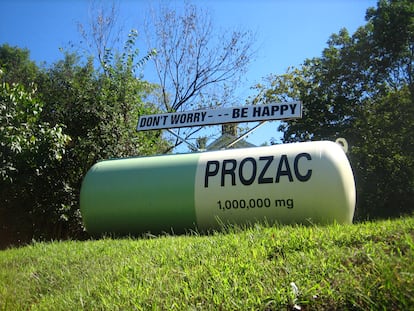New study: low serotonin does not cause depression
Psychiatrists recall that clinical trials show the efficacy of antidepressants and that they are a useful complement to treatments such as psychotherapy

In 1987, Prozac was approved for use in the United States. The synthetic compound changed how depression was being treated. Its mechanism of action – increasing serotonin levels in the body – led to the hypothesis that mental illness was caused by a chemical imbalance.
This interpretation helped reduce stigma surrounding those suffering from depression. They were no longer seen as having a character flaw or a disease of the soul. Instead, they were impaired by a physical disorder, like diabetes, that could be repaired with medication.
The pharmaceutical company Lilly – also responsible for marketing the first brand of insulin – was earning $2.5 billion a year from Prozac by the end of the 1990s. Since then, the drugs in the Prozac family – known as selective serotonin reuptake inhibitors – have multiplied.
In Spain, the consumption of antidepressants increased by 6% between 2020 and 2021, a growing trend in line with the rest of the world. In the United Kingdom, one in six people have received a prescription for antidepressants. A study published in The Lancet magazine last year concluded that, during the pandemic, depressive disorders increased by almost 30% worldwide.
Last week, a paper was published in Molecular Psychiatry questioning the hypothesis that depression is related to serotonin deficiency. The authors, led by Joanna Moncrieff and Mark Horowitz of University College London (UK), conducted an extensive review of studies in which they found no link between low serotonin levels and depression. Nor did they find that healthy people had greater serotonin activity than sick people. In fact, they even found that reducing serotonin levels with drugs did not worsen the mood of volunteers who participated in these experiments. Moncrieff and Horowitz concluded that “the massive research effort based on the serotonin hypothesis has not produced convincing evidence for a biochemical basis for depression.”
The results and quality of the study have largely been accepted by the scientific community, which for more than 20 years has questioned the validity of serotonin imbalance as an explanation for a disease as complex as depression.
In an article for The Conversation, Moncrieff and Horowitz highlight the use of the serotonin hypothesis in promotional campaigns for antidepressants designed by the pharmaceutical industry. They suggest that the main effects of antidepressants seem to have to do with creating placebos or emotionally numbing patients. If this is the case, they say that “it is not clear that [the antidepressants] do more good than harm.” They also consider that the biochemical hypothesis – once seen as a tool to reduce the stigma around mental illness – makes people pessimistic about the possibility of learning how to regulate their moods and recover.
Still, they have faced much criticism. María Portella, head of the mental health group at the Biomedical Research Institute of the Sant Pau Hospital in Barcelona, believes that “the results of the study are correct, but the interpretation is exaggerated…. the efficacy of antidepressants is not looked at. These types of antidepressants improve mood and are one of the ways to treat depression.”
“[Perhaps] too many people are being treated with these drugs,” she continues, “but to conclude from this lack of relationship between serotonin levels and depression that [selective serotonin reuptake inhibitors] don’t work is incorrect.”
“The fact is that when you do clinical trials with antidepressants, 70% of people improve, which is a figure comparable to that of other drugs, for diseases such as diabetes or cardiovascular diseases, which we consider effective.”

Víctor Pérez, head of psychiatry at the Hospital del Mar in Barcelona, affirms that “the effect of antidepressants is overwhelming.” However, it affects the complexity of mental illness and what we call depression.
“There is no single treatment… psychotherapy can be as effective as antidepressants to treat depression, but we must also take into account that it takes time and has a cost that makes it less accessible than drugs,” he says. “In life, we all have conflicts of interest. For a psychiatrist who prescribes antidepressants and makes a living from them, doubting their efficacy is outrageous. The authors of this study belong to a group of professionals who defend treatment without antidepressants.”
Víctor Peralta, from the Health Research Institute of Navarra, thinks that Moncrieff and Horowitz were biased in their approach.
“Their study excluded depressive conditions such as bipolar disorder, in which there is a basic biochemical disorder that responds best to antidepressants that raise serotonin,” he argues.
“In any case, the clinical reality – the one that those of us who treat patients see – is very eclectic. Antidepressants work, but the response must be accompanied by a psychotherapeutic approach. And the antecedents of the problem are also studied to understand the context in which depression arises, in order to provide an adequate response.”
Peralta also affirms that “there are depressions that are recurrent. It is necessary to explain the possibilities of relapse – which sometimes occur due to seasonal alterations – so as to take a psychotherapeutic and educational approach, to teach the patient to detect the first symptoms and also offer antidepressants, which are useful to prevent relapses.”
Even today, mental illnesses such as depression lack biological markers that allow their presence in the body to be detected with blood or urine tests. They have to be identified by their symptoms alone. The search for material causes and solutions has researchers like Moncrieff at the other extreme of the spectrum: he believes that thinking of depression as a disease of the brain is incorrect.
In a recent article, Moncrieff wrote: “Perhaps our common-sense understanding of depression is more helpful than the medical one. Our moods and our emotions are almost always reactions to what is happening in our lives. We feel good when things are going well, and sad, anxious, angry or frustrated when things are going badly.”
Moncrieff doesn’t believe that the brain triggers these emotions. Poverty, debt, divorce, child abuse, loneliness... these factors can predict whether someone is going to be depressed or not. Helping people understand their problems and face them, through therapy, meditation and even social measures – without the need for drugs – is the solution that this expert advocates for depressed people.
The psychiatrists consulted by this newspaper did not reject this kind of approach, but many consider that ruling out the use of antidepressants – even though they have limitations – is not necessary to effectively apply the methods that Moncrieff proposes. In the long term, it is true that psychiatric illnesses will have less individual impact if living conditions improve for the majority… but that could take decades. And many depressed people can’t afford to wait so long.
Tu suscripción se está usando en otro dispositivo
¿Quieres añadir otro usuario a tu suscripción?
Si continúas leyendo en este dispositivo, no se podrá leer en el otro.
FlechaTu suscripción se está usando en otro dispositivo y solo puedes acceder a EL PAÍS desde un dispositivo a la vez.
Si quieres compartir tu cuenta, cambia tu suscripción a la modalidad Premium, así podrás añadir otro usuario. Cada uno accederá con su propia cuenta de email, lo que os permitirá personalizar vuestra experiencia en EL PAÍS.
¿Tienes una suscripción de empresa? Accede aquí para contratar más cuentas.
En el caso de no saber quién está usando tu cuenta, te recomendamos cambiar tu contraseña aquí.
Si decides continuar compartiendo tu cuenta, este mensaje se mostrará en tu dispositivo y en el de la otra persona que está usando tu cuenta de forma indefinida, afectando a tu experiencia de lectura. Puedes consultar aquí los términos y condiciones de la suscripción digital.









































